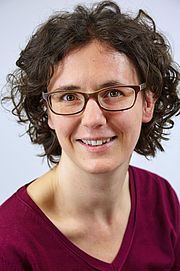Where can students solve current problems arising in businesses today and at the same time meet potential employers? How can companies operating in the wine business get fresh marketing ideas and at the same time come to know motivated young talents from the wine sector? The 3rd Geisenheim Case Study Day initiated by the Department of Wine and Beverage Business of Hochschule Geisenheim again counted on the successful knowledge exchange between theory gained at university and practice.
In small teams 16 students worked for one day on the case studies of the sparkling wine producers Rotkäppchen Mumm and Hawesko Holding. Both companies came with late-breaking “social media“ issues and sought input by Geisenheim students. In cooperation with company representatives, students developed a marketing strategy for social media communication in the Hawesko online wine trade. Rotkäppchen-Mumm focused on increasing its target group for non-alcoholic products with the help of social media.
“The Case Study Day is of special importance to us since it provides a dedicated way of preparing our students for the daily business routine while at the same time allowing them to network with renowned companies,” said Prof. Dr. Simone Loose, Head of the Department of Wine and Beverage Business at our university. “When solving cases taken from business practice our students can find out how efficiently they can apply theoretical knowledge acquired in Geisenheim under real working conditions within a limited period time and in mixed teams,” emphasized Prof. Dr. Gergely Szolnoki.
“It is a unique chance to gain a detailed insight into the work environment of successful companies in our sector, especially relating to operating principles, project organization and time management,” said Martin von Knebel, student of International Wine Business. “It was a real challenge to work on the allegedly simple tasks together with assigned team members within the short period of time given and come to concrete results,” summarized Philipp Hawranek, student of International Wine Business. “I felt especially valued for the work done. I had the feeling that both companies were really interested in our results,” Paul Kern, student of International Wine Business, summed up. “Particularly for viticulture students this was an interesting opportunity to broaden your horizon and, within a short period of time, get to know a lot about how trading companies and their purchasers think,” Hans-Christoph Stolleis, student of Viticulture and Enology pointed out. “No student should miss such a unique opportunity to work together with renowned companies in an incredibly practice-oriented and close way,” recommended Philipp Hawranek, student of International Wine Business. “All in all I can highly recommend all students to take part in the Case Study Day since it is a lot of fun to try and test yourself and at the same time get an insight into companies and establish contacts with them,” Moritz Hoffmann, student of International Wine Business, rounded off the comments.
Our partners in industry also benefited directly from the 3rd Geisenheim Case Study Day: “For us as companies it is incredibly exciting to use the interesting results from the case study as food for thought for further action as well as to work so closely together with the students,” emphasized Katharina Eichinger of Rotkäppchen-Mumm. “As always, talking with the students has been really enriching for us. We have invited the winning team to visit us in Hamburg to develop the exciting concept even further,” Anna-Helene Bunge of Hawesko summarized the day. “We would like to express a big thank-you for the Case Study Day. We consider this concept to be very successful and the day has left us with a very positive impression. We particularly enjoyed the open and informal campus atmosphere which we could feel the entire day,” added Katharina Eichinger of Rotkäppchen-Mumm.
After a stressful day both parties enjoyed the final get-together. While having wine and finger-food, both students and companies were not only able to establish contacts but also prepare the ground for several internship contracts and contracts for work and services.


























